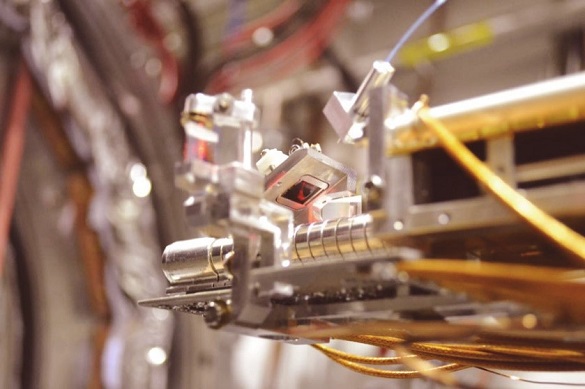
AEgIS antihydrogen detection region. Image credit: Michael Doser, CERN
University of Liverpool physicists are leading a £1M antimatter research project as part of the AEgIs experiment at CERN.
The project entitled `Slow Neutral Antimatter Atoms in Excited States for Inertial-type Precision Measurements’ (SNAP) is funded by The Engineering and Physical Sciences Research Council (EPSRC).
The University of Liverpool was the first UK university to join the AEgIS (Antihydrogen Experiment: Gravity, Interferometry, Spectroscopy) antimatter experiment which aims to measure the gravitational fall of an antihydrogen pulsed beam.
AEgIS will create nanostructured silicon membranes with a few micrometre thickness, a geometrically optimized positron-to-positronium converter that will be used to efficiently form a Positronium (Ps) beam in a cryogenic UHV environment.
Making use of AEgIS’s two established laser systems for Ps excitation, Liverpool physicists, led by Professor Carsten P Welsch, aim to make important contributions to laser-cool this exotic system for the first time.
The goal will be to create the world-wide coldest Ps-beam and Professor Welsch’s QUASAR Group is extremely well-positioned for this with group member, Dr Benjamin Rienaecker, already contributing substantially to the first successful production of pulsed antihydrogen from AEgIS in 2018.
This cold beam will then form the basis of a cutting-edge research programme, targeting the systematic study of excited neutral Positronium atoms passing through a matter grating to study the effect of van-der-Waals forces of the matter grating on neutral excited atoms.
Professor Welsch, who has been leading the pan-European Horizon 2020 antimatter research network AVA, said: “We will tackle some of the most fundamental questions about antimatter. We will develop new technologies and know-how, working within the wider AEgIS team at CERN. We have very ambitious plans and target a transformational science program. We are extremely grateful for this major funding award and cannot wait to start our project.
“The announcement of this AEgIS award concludes an amazing year for the University of Liverpool’s Department of Physics which has received millions of pounds in funding for the next-generation plasma accelerator EuPRAXIA, a prestigious Leverhulme Professorship grant, as well as £1.3 million for its new STFC Centre for Doctoral Training LIV.INNO to pioneer innovation in data-driven research.”
The AEgIS spokesperson, Dr Michael Doser (CERN), said: “Congratulations to the Liverpool team for this major award. The research field that is being pioneered in the framework of the AEgIS experiment will greatly benefit from the breakthrough advances that the obtained grant will target.”
The AEgIS experiment involves physicists from a number of countries in Europe as well as from India.
More information about AEgIS: https://aegis.web.cern.ch/home.html